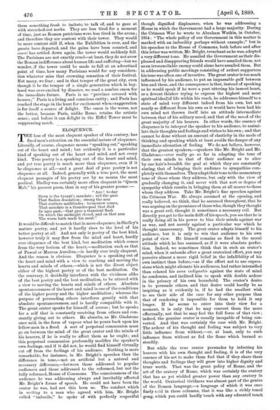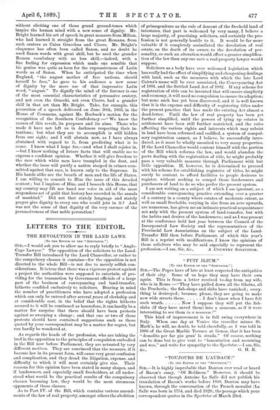ELOQUENCE.
THE loss of the most eloquent speaker of this century, has fixed men's attention on the essential nature of eloquence. Literally, of course, eloquence means " speaking out," speaking out of the heart and mind ; but evidently it is a particular
kind of speaking out of the heart and mind, and not every kind. True poetry is a speaking out of the heart and mind, and yet true poetry is much more than eloquence, even if it be eloquence at all,—and a great deal of pure poetry is not eloquence at all. Indeed, generally with a true poet, the most eloquent passages of his poetry are by no means the most poetical. Shelley was certainly more often eloquent in "Queen Mab," his poorest poem, than in any of his greater poems :—
" Aye ! to-day Stern is the tyrant's mandate ; red the gaze That flashes desolation ; strong the arm That scatters multitudes : to-morrow comes, That mandate is a thunder-peal that died In ages past,—that gaze a transient flash On which the midnight closed, and on that arm The worm hath made his meal."
It would be difficult to match that in mere eloquence, in Shelley's mature poetry, and yet it hardly rises to the level of his better poetry at all. And not only is poetry of the best kind, however truly it may flow from the mind and heart, hardly ever eloquence of the best kind, but meditation which comes from the very bottom of the heart,—meditation such as that
of Pascal or Marcus Aurelius,—is hardly ever truly eloquent. And the reason is obvious. Eloquence is a speaking out of 'the heart and mind with a view to reaching and moving the hearts and minds of others,—which is not the direot object either of the highest poetry or of the best meditation. On the contrary, it decidedly interferes with the vividness alike of the best poetry and the best meditation, to be uttered with a view to moving the hearts and minds of others. Absolute spontaneousness of the heart and mind is one of the conditions of the higher poetry and the higher meditation ; whereas the purpose of persuading others interferes greatly with that absolute spontaneousness, and is hardly compatible with it. The great orator speaks for himself, of course ; but he speaks for a self that is constantly receiving from others and con- stantly giving out to others. He absorbs, as Mr. Gladstone once said, in the form of vapour what he pours back upon his fellow-men in a flood. A sort of perpetual communion must go on between the mind of the great orator and the minds of his hearers, if he is really to affect them as he ought; and this perpetual communion profoundly modifies the speaker's own feelings, and if it did not, he would find himself virtually cut off from the feelings of his audience. Nothing is more remarkable, for instance, in Mr. Bright's speeches than the difference in tone,—not an artificial but a natural and necessary difference,—between those addressed to popular audiences and those addressed to the reformed, but not the fully reformed, House of Commons. The consciousness of the audience he was addressing always and inevitably affected Mr. Bright's forms of speech. He could not have been the orator he was, had not this been so. The conduct which in writing to a man who agreed with him, Mr. Bright called "imbecile," he spoke of with perfectly respectful though dignified displeasure, when he was addressing a Haase in which the Government had a large majority. During the Crimean War he wrote to Abraham Watkin, in October, 1854: " The whole policy of our Government in this matter is marked with an imbecility perhaps without example;" but in his speeches to the House of Commons, both before and after this letter was written, Mr. Bright, trenchant as he was, adopted a very different tone. He assailed the Government as their dis- pleased and disapproving friends would have assailed them, not as an irreconcilable enemy could alone have assailed them. But in addressing public meetings consisting of ardent supporters his tone was often one of invective. The great orator is too much influenced by his audience, to put an impassable gulf between him and them, and the consequence is that, instead of speaking as he would speak if he were a poet uttering his inmost heart, or a devout thinker trying to express the highest and most spiritual ideal'of life within his reach, he addresses himself to a state of mind very different indeed from his own, but not nearly so different from his own as it would have been had his own mind not thrown itself into an attitude intermediate between that of his solitary mood, and that of the mood of the great majority of his hearers. In other words, the essence of eloquence is to interpret the speaker to his audience, to assimi- late their thoughts and feelings and wishes to his own ; and that cannot be done without an amount of elasticity in the mode of thinking and speaking which at least avoids the danger of any immediate alienation of feeling. We do not believe, however, that the greatest speakers,—speakers like Mr. Bright and Mr. Gladstone,—ever really go so far in adapting the tone of their own minds to that of their audience as to alter by one hair's-breadth the goal at which they are constantly aiming, that of bringing their audience to sympathise com- pletely with themselves. They adapt their tone to the momentary tone of those whom they address, but only with the view of gradually changing it, and never with that sort or degree of sympathy which results in bringing them at all nearer to those whom they address. Take Mr. Bright's fine speeches against the Crimean War. He always assumed at the opening, and really believed, we think, that he assumed throughout, that he was arguing on the premisses of those who, though they thought war a great evil, thought it sometimes a necessary evil. But directly you get to the main drift of his speech, you see that he is really doing all in his power to bias their minds against war as war, and not merely against a particular war which he thought unnecessary. The great orator adapts himself to his audience, but it is only to win that audience to his own point of view. He himself remains as fixed in the moral attitude which he has assumed, as if it were absolute perfec- tion. Indeed, we sometimes think that in such an orator's mind, when it unbends after a great oratorical effort, you may perceive almost a more rigid belief in the infallibility of his own instinct than before,—as if the effort not to use expres- sions which might alienate his audiences, had rather intensified than relaxed his swim indignatio against the state of mind he condemns, and inclined him to speak with double ardour in the privacy of his own household. The orator's desire is to persuade others, and that desire could hardly be as inspiring as it evidently is, if he had the smallest wish to see their side of the case for any other purpose than that of rendering it impossible for them to hold it any longer. If he seems to enter into their view for a moment, it is only that he may convert them the more effectually, not that he may feel the full force of that view ; indeed, the genuine orator is usually incapable of being con- verted. And that was certainly the case with Mr. Bright. The ardour of his thought and feeling was subject to very little influence from without,—or, at least, only to such influence from without as fed the flame which burned so steadily.
But while the true orator persuades by infecting his hearers with his own thought and feeling, it is of the very essence of his art to make them feel that if they share these thoughts and feelings they will grow into higher dignity and truer worth. That was the great policy of Rome, and the art of the oratory of Rome, which was certainly the oratory that has as yet wielded greater power than any oratory in the world. Oratorical vividness was almost part of the genius of the Roman language,—a language of which it was once finely said in these columns, that it was like a richly toned gong, which you could hardly touch with any educated touch without eliciting one of those grand ground-tones which inspire the human mind with a new sense of dignity. Mr. Bright learned his art of speech in great measure from Milton, who had learned it straight from the great Romans, from such orators as Caius Gracchus and Cicero. Mr. Bright's 'eloquence has often been called Saxon, and no doubt he used Saxon words with great skill, but he used the grander Roman vocabulary with no less skill,—indeed, with a fine feeling for expression which made one sensible that his genius was quite as keen for the expressiveness of Latin words as of Saxon. When he anticipated the time when England, " the august mother of free nations, should herself be free," he gave to his audience a new sense of dignity by the mere use of that impressive Latin word, " august." To dignify the mind of the listener is one of the most essential characteristics of persuasive oratory, and not even the Gracchi, not even Cicero, had a grander skill in that art than Mr. Bright. Take, for example, this peroration of a speech delivered on June 30th, 1863, in the House of Commons, against Mr. Roebuck's motion for the recognition of the Southern Confederacy We know the causes of this revolt, its purposes and its aims. Those who made it have not• left us in darkness respecting their in- tentions; but what they are to accomplish is still hidden from our sight; and I will abstain now, as I have always abstained with regard to it, from predicting what is to come. I know what I hope for,—and what I shall rejoice in, —but I know nothing of future facts that will enable me to express a confident opinion. Whether it will give freedom to the race which white men have trampled in the dust, and whether the issue will purify a nation steeped in crimes com- mitted against that race, is known only to the Supreme. In His hands alike are the breath of men and the life of States. I am willing to commit to Him the issue of this dreaded contest ; but I implore of Him, and I beseech this House, that my country may lift nor hand nor voice in aid of the most -stupendous act of guilt that history has recorded in the annals -of mankind." Did not that stately language and stately prayer give dignity to every one who could join in it ? And was not the sense of that dignity of the very essence of the persuasiveness of that noble peroration ?



































 Previous page
Previous page